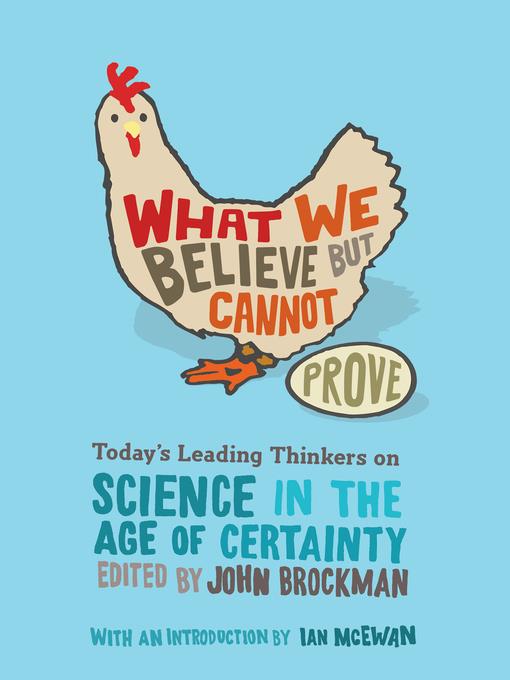
What We Believe but Cannot Prove
Today's Leading Thinkers on Science in the Age of Certainty
کتاب های مرتبط
- اطلاعات
- نقد و بررسی
- دیدگاه کاربران
نقد و بررسی

February 6, 2006
The title's question was posed on Edge.org (an online intellectual clearing house), challenging more than 100 intellectuals of every stripe—from Richard Dawkins to Ian McEwan—to confess the personal theories they cannot demonstrate with certainty. The results, gathered by literary agent and editor Brockman, is a stimulating collection of micro-essays (mainly by scientists) divulging many of today's big unanswered questions reaching across the plane of human existence. Susan Blackmore, a lecturer on evolutionary theory, believes "it is possible to live happily and morally without believing in free will," and Daniel Goleman believes children today are "unintended victims of economic and technological progress." Other beliefs are more mundane and one is highly mathematically specific. Many contributors open with their discomfort at being asked to discuss unproven beliefs, which itself is an interesting reflection of the state of science. The similarity in form and tone of the responses makes this collection most enjoyable in small doses, which allow the answers to spark new questions and ideas in the reader's mind. It's unfortunate that the tone of most contributions isn't livelier and that there aren't explanations of some of the more esoteric concepts discussed; those limitations will keep these adroit musings from finding a wider audience.

March 15, 2006
Compiled by noted science book editor Brockman, this collects responses to a question posted on www.edge.org: "What do you believe is true, even though you cannot prove it?" Answers range from a sentence to a half page to a few pages in length. The 109 respondents include such figures as evolutionary biologist Richard Dawkins, psychologist Steven Pinker, planetary scientist Carolyn Porco, novelist Ian McEwan (who wrote the book's introduction), and magazine editor Chris Anderson. Some, like Robert Sapolsky, muse on the existence of God. Others speculate on the nature of consciousness or on the limits of computing power. Presented here are a wide range of ideas entertained by a wide range of people, and taken together, these essays represent a broad spectrum of what contemporary thinkers consider to be challenging questions. Recommended for public and academic library science collections.Garrett Eastman, Roland Inst. at Harvard Univ., Cambridge, MA
Copyright 2006 Library Journal, LLC Used with permission.

February 1, 2006
In this informative and often surprising book, more than 100 notable scientists and scholars answer the question, "What do you believe even though you cannot prove it?" The responses range from the thought-provoking to seemingly trivial (or just plain silly). Professor of cosmology and astrophysics Martin Rees, for example, admits that he believes intelligent life is unique to our world (in sharp contrast to many of his fellow contributors). Alun Anderson, senior consultant to " New Scientist "magazine, believes cockroaches are conscious. Mathematician and science-fiction novelist Rudy Rucker believes in a multiplicity of universes. Susan Blackmore, who has written widely on the subject of consciousness, appears to believe that she doesn't exist. The contributors touch on a broad spectrum of subjects, from religion to science and many points in between. Although some of the responses are arrogant or nitpicky, the majority are thoughtful, honest, and revelatory of the contributors' own intellectual and philosophical biases. And the book certainly gets us thinking about our own deeply held, if entirely unprovable, beliefs.(Reprinted with permission of Booklist, copyright 2006, American Library Association.)

























دیدگاه کاربران